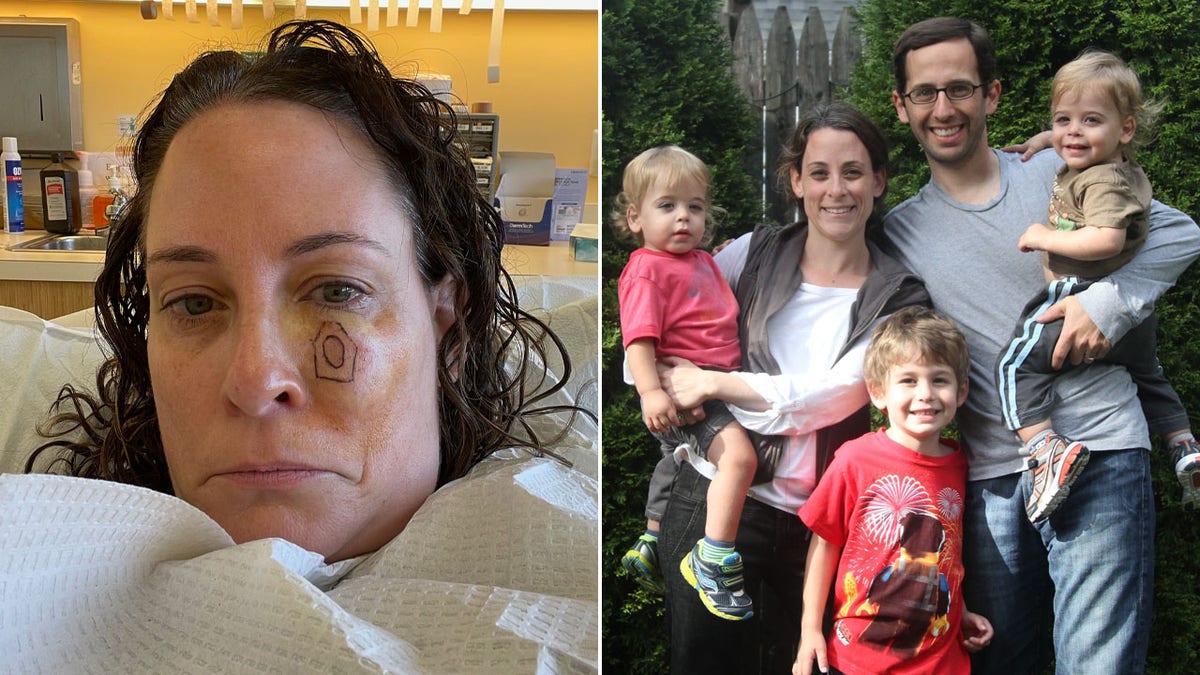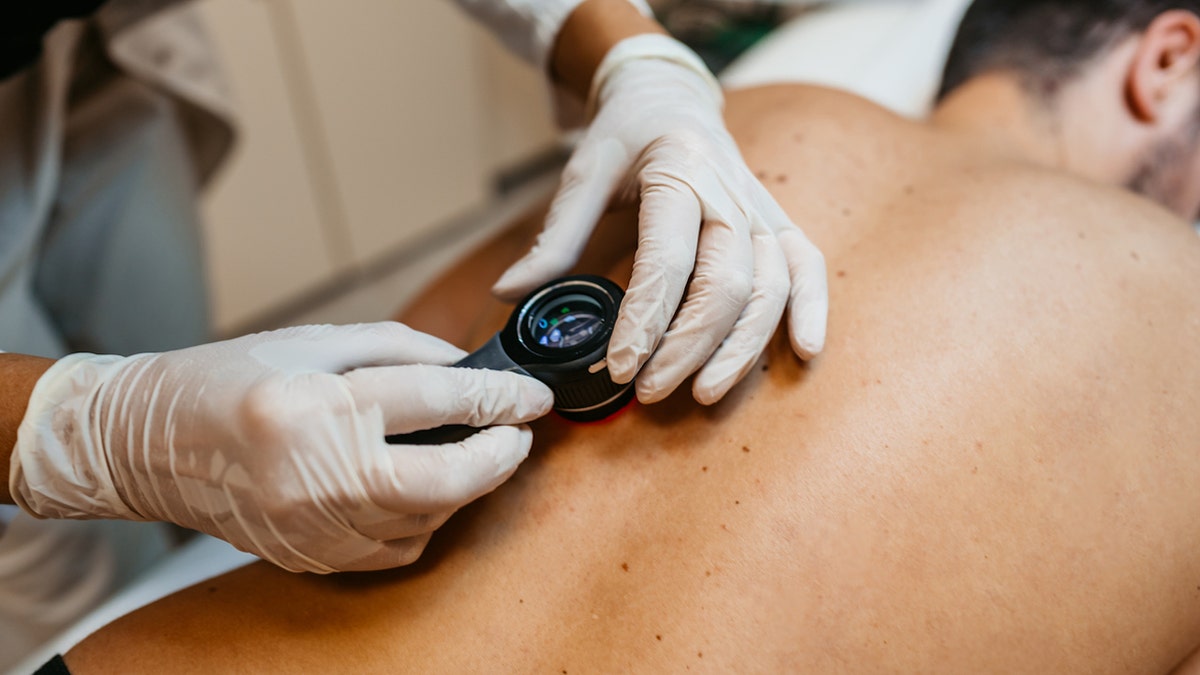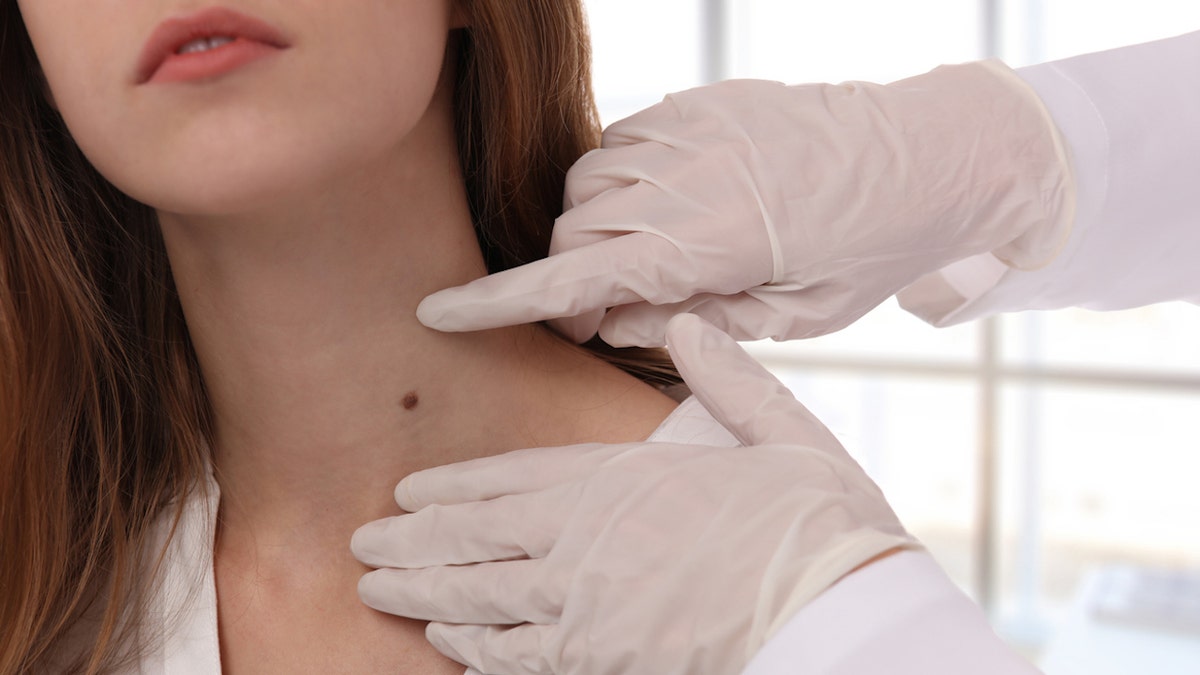Fox News Flash top headlines for May 16
Fox News Flash top headlines are here. Check out what's clicking on Foxnews.com.
Skin cancer is the most common type of cancer in the U.S. — with one in five Americans developing the disease by the age of 70.
Melanoma is the deadliest form of skin cancer, expected to take the lives of more than 8,200 people in the U.S. this year.
This May, for Skin Cancer Awareness Month, two melanoma patients are sharing their stories of how they overcame this invasive form of the disease.
SKIN CANCER CHECKS AND SUNSCREEN: WHY THESE (STILL) MATTER VERY MUCH FOR GOOD HEALTH
One even wrongly assumed that what she was experiencing "was just a normal part of aging and sun exposure." Here's what others can learn.
What is melanoma?
Melanoma is a type of skin cancer that starts in the melanocytes, which are the cells that produce the skin’s pigmentation (color).
Most cases — but not all — are caused by exposure to ultraviolet light. Melanoma can affect people of all skin tones and types.
"Melanoma is one of the most common type of cancer in younger patients," Nayoung Lee, M.D., assistant professor of dermatology at NYU Langone Health, told Fox News Digital.

Abby Weiner, pictured at left and at right with her husband and sons, was diagnosed with melanoma in Oct. 2023. (Abby Weiner)
The prognosis is "very good" when melanoma is detected early, but the survival rate falls steeply when it is detected at a more advanced stage, she noted.
"Melanoma can spread through the bloodstream to your lymph nodes and distant organs, so it is crucial to do regular skin exams to try to catch it at an early stage," Lee said.
One mom's story
Abby Weiner, 43, a wife and mother of three young boys living in Washington, D.C., had always been careful about protecting her skin from the sun — which is why her Oct. 2023 melanoma diagnosis was such a shock, she said.
"I had a spot on my cheek that started as a freckle and began getting darker and larger," she told Fox News Digital.
"I assumed it was just a normal part of aging and sun exposure."
VACCINE FOR DEADLY SKIN CANCER SHOWS ‘GROUNDBREAKING’ RESULTS IN CLINICAL TRIAL
Weiner’s sister encouraged her to get it checked out — which led to a biopsy and diagnosis.
"I was obviously shocked and frightened at first," said Weiner.
Her melanoma was removed using Mohs surgery, a procedure in which thin layers of skin are removed one at a time.
"I required two procedures to remove the cancer and surrounding margins," she said. "Now, most people don't even know I had surgery."
To others, Weiner’s advice is to remember to seek shade, wear sun-protective clothing, and apply a broad-spectrum, water-resistant sunscreen with an SPF of 30 or higher on a daily basis all year long.
"If we were eating outdoors and there wasn't a table in the shade, I would end up sitting in the sun."
"I thought I was careful about protecting myself from sun exposure by wearing a hat or applying sunscreen when my family was at the pool or planning to be outdoors — but if we were eating outdoors and there wasn't a table in the shade, I would end up sitting in the sun."
Now, Weiner said she will wait a little longer for a shaded table, and she always keeps a hat and sunscreen with her.
"My sons used to have difficulty applying sunscreen and wearing hats, but now that they've seen the impact skin cancer had on me, they are more cooperative," she said.
CANCER SCREENINGS: HERE ARE 5 TYPES AND CRITICAL INFORMATION TO KNOW ABOUT EACH
Weiner also recommends that everyone gets yearly skin checks with a board-certified dermatologist.
"I have so many friends — and even my sister, who probably saved my life — who didn't regularly see a dermatologist for a yearly skin check before they learned about my melanoma."
One beach lover's story
Steve Murray, 68, of the greater Washington, D.C. area, has worked in construction for several decades.
During his childhood, Murray spent summers at the beach in Ocean City, New Jersey, and winter visits to Florida, where he was exposed to the sun and didn’t do much to protect himself.
In the late 1990s, Murray was diagnosed with basal cell carcinoma, the most common type of skin cancer, and squamous cell carcinoma, a variation of skin cancer that tends to develop in people who have had a lot of sun exposure.
In 2008, he was diagnosed with melanoma.
"My initial symptoms included itching and scaling on my head, followed by irritation," he told Fox News Digital.
"Then there was discoloration and irregularity in the shape of my moles."
"You don’t notice at the time of initial exposure, but it haunts you later in life."
Initially, Murray feared the worst — "mainly death" — but his dermatologist determined that the melanoma was only on his scalp and hadn’t traveled to his lymph nodes.
Like Weiner, Murray had Mohs surgery to get rid of the cancer — and he was cleared.
VIRGINIA HIGH SCHOOL STUDENT CREATES SOAP TO FIGHT SKIN CANCER, IS AWARDED $25K: 'REMARKABLE EFFORT'
Since that diagnosis, Murray has had several more bouts of skin cancer.
In 2024, he underwent two surgeries for squamous cell carcinoma on his hand and back.
Now, Murray visits the dermatologist every three to six months. Also, he always wears a hat, sunscreen and long sleeves whenever possible to protect himself from the sun.

Abby Weiner is pictured with her three young sons. "My sons used to have difficulty applying sunscreen and wearing hats, but now that they've seen the impact skin cancer had on me, they are more cooperative," she said. (Abby Weiner)
Murray’s advice to others is to make sun protection a priority when outdoors.
"You don’t notice at the time of initial exposure, but it haunts you later in life when you start developing pre-cancers and skin cancers like squamous cell carcinoma and melanoma that require immediate attention," he told Fox News Digital.
"Capturing these pre-cancers and cancers of the skin must be diagnosed early with regular checkups," he added. "Failure to do so could lead to death."
5 protection tips from an expert
Dr. Lee of NYU Langone Health shared five tips to help prevent potentially deadly skin cancers like melanoma.
1. Skip the sunbathing
"Avoiding a burn is really only half the battle — there is no such thing as a base tan," Lee said. "Damaged skin is damaged skin."
For a safer way to achieve a sun-kissed glow on your first beach day of the summer, Lee recommends using self-tanning products.
2. Wear sunscreen every day, in all weather and in every season
When applying sunscreen, Lee recommends using 1 ounce, which would fill a shot glass.
IF YOU OR YOUR CHILDREN HAVE FRECKLES, HERE'S WHAT YOUR SKIN IS TRYING TO TELL YOU
"It should have a sun protection factor (SPF) of 30 and say ‘broad-spectrum’ on the label, which protects against the sun’s UVA and UVB rays," she said.
Reapply at least every 80 minutes, or more often if you’re sweating or swimming.
3. Use physical sunscreen
Physical sunscreen contains zinc or titanium, which is superior in efficacy to chemical sunscreen, according to Lee.
4. Learn how to do a skin self-exam
"Check your skin regularly so you know what’s normal and to notice any changes or new growths," Lee advised.

"Not all melanomas are dark and scary-appearing," a doctor said. "They can be amelanotic, which means they can be more skin colored or pink." (iStock)
"Seek a dermatologist’s evaluation if you notice a changing, bleeding or persistently itchy spot."
5. Apply the ABCDE rule
This is the best way to determine if any mole or blemish is cancerous, according to Lee.
The ABCDE rule tells you what to look for when examining your skin.
CLICK HERE TO SIGN UP FOR OUR HEALTH NEWSLETTER
The A stands for asymmetrical. "Noncancerous moles are typically symmetrical," Lee said.
B is for border, as the border of a cancerous spot or mole may be irregular or blurred.

The ABCDE rule is the best way to determine if any mole or blemish is cancerous, according to a dermatologist. (iStock)
C stands for color. "A typical mole tends to be evenly colored, usually a single shade of brown," Lee noted.
"Not all melanomas are dark and scary-appearing. They can be amelanotic, which means they can be more skin colored or pink."
D stands for diameter of the spot or mole, which may be a warning sign if it’s larger than 6 millimeters, according to Lee.
If the spot is evolving, which is what E stands for, it might be of concern.
CLICK HERE TO GET THE FOX NEWS APP
Lee added, "Because melanomas can vary in appearance, it is important to see a dermatologist regularly for skin exams if you have a history of significant sun exposure, have many atypical appearing moles, or a family or personal history of melanoma so that you have an experienced set of eyes looking at any spots of concern."


